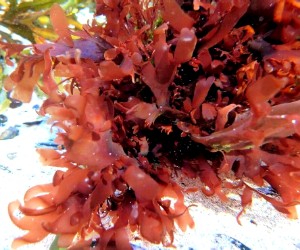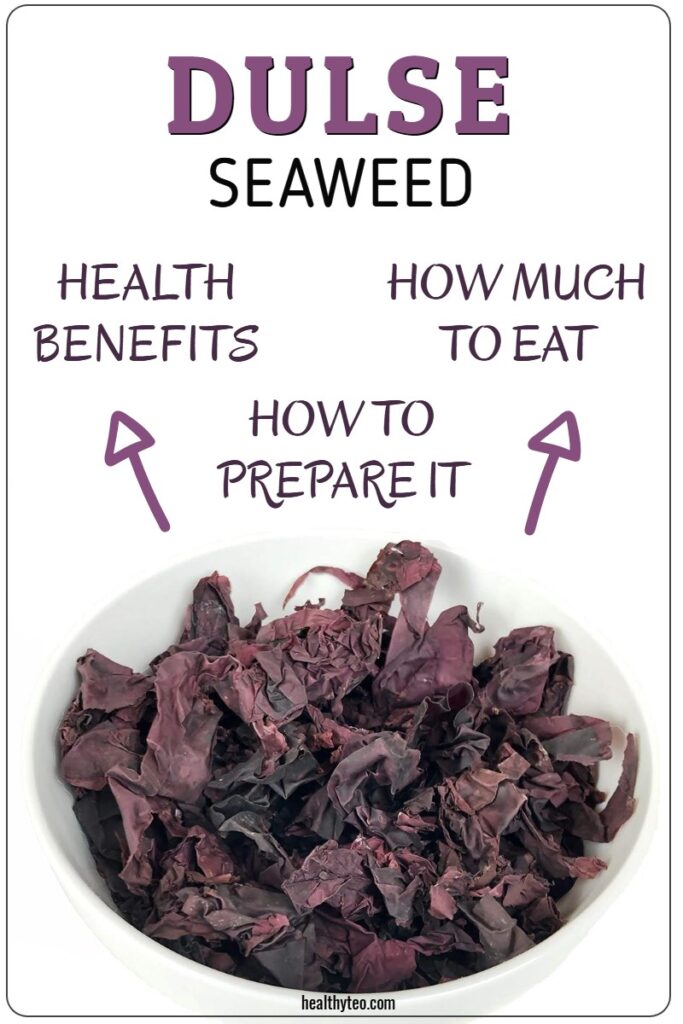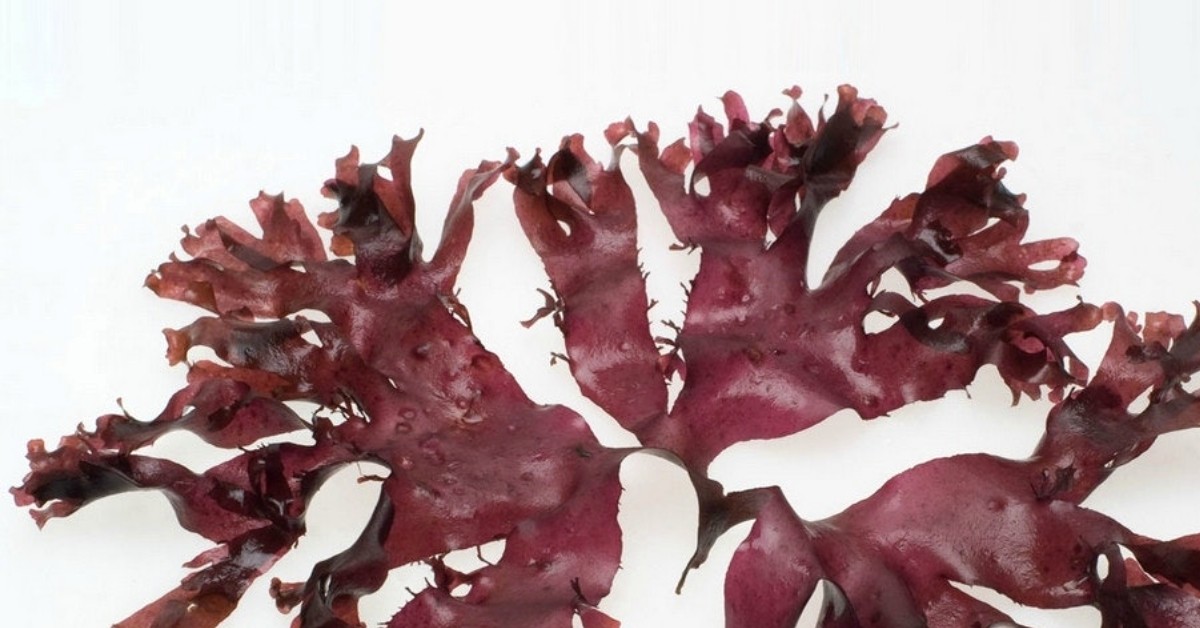Benefits of eating dulse (red algae) and how much you should consume daily
This seaweed is a great sea vegetable with nutritional value that is better than some land-based plants. Dulse is a great food choice if you care about your health and want to follow a healthy diet.
If you are not familiar with the health benefits of dulse, how much should you eat per day or you want to learn how to prepare this healthy seaweed, you are at the right place.
We’ve covered all these topics in this article. First, let’s see what is dulse and where it comes from? Is this new or food used for centuries?
This post may contain affiliate links, which means we may receive a small commission, at no cost to you, if you make a purchase through a link. For more information, please see our disclosure.
What Is Dulse?
Dulse (Palmaria Palmata) is a red alga with leathery fronds (leaves) that grows along the northern coastlines of the Pacific and Atlantic oceans. It is collected by hand by the harvesters plucking it from the rocks at low tide.
The good thing about this red algae is that it is perennial and when is cut or plucked, new growth appears from the previous season’s leaf.
This sea vegetable Europeans have been eating for more than 1.500 years. It is harvested mainly in Ireland and the shores of the Bay of Fundu in eastern Canada. After picking the seaweed is laid out to the sun to dry for 6-8 hours. If that is not possible, can be stored in seawater for a few days, but it soon deteriorates.

Today we know that dulse is rich in vitamins, minerals, antioxidants, protein, and fiber. It is eaten worldwide, packed for sale in plastic bags, 50 g per bag, broken into flakes, or ground into powder for use as seasoning. Dried dulse is often served as a snack in bars (for free) because it induces thirst.
Dulse Benefits
Extremely rich in iodine
One of the major health benefits of dulse is that can play an important role in proper thyroid function.
Dulse seaweed is an iodine-rich sea vegetable with a 30 g serving to provide 110% of the RDI for this compound. Iodine is an essential mineral for the thyroid and it is crucial for the proper function of the thyroid gland. Iodine is so important for the thyroid that is called ” food for the thyroid”.
Iodine also displaces dangerous “halides” such as bromide, chlorine, and fluorine in the thyroid. Except for the thyroid function, iodine also is an antioxidant, protects from radiation, and kills bacteria and fungi.
You should know that if you eat too much dulse you can upset the balance of hormones in your thyroid. So, eat dulse in moderation. People with hypo or hyperthyroidism should probably avoid eating dulse.
Rich source of vitamins
Only 7 gram serving of Dulse seaweed provides around 40% vitamin A. Vitamin A acts as an antioxidant and prevents free radicals from damaging the tissues of the eye and causing macular degeneration.
In Dulse, it is in the form of beta carotene. Vitamin A is also a component of rhodopsin, a protein in the eye that boosts vision in low light conditions.
Eating Dulse is an excellent way for vegans or people who don’t eat animal foods to get sufficient vitamin B-12. A 3.5-ounce portion of fresh dulse contains 6.6 micrograms of vitamin B-12, which is more than 100 percent of the daily value set by the FDA.
This vitamin assists in making new cells and breaking down some fatty acids and amino acids. Also protects nerve cells and encourages their normal growth.
Vitamin B-12 deficiency can cause memory loss, dementia, and numbness in the arms and legs. That’s why Dulse is such good food especially for those who are on a vegan or vegetarian diet.
Vitamin C helps our immune system to be stronger. Among many other functions act as antioxidants, neutralizing unstable molecules that can damage cells. Helps with collagen production and white blood cell count.
Digestive health
The superfood dulse contains a large amount of dietary fiber. In a 2 ounce serving, you get 16 grams of fiber.
This soluble fiber absorbs water in the digestive system to form a gel-like substance. It helps to soften the stool and bind the substances like cholesterol and sugar, thus preventing or slowing their absorption into the blood.
Seaweed fibers are different from those found in land-based foods. They contain alginic acid also called alginate (polysaccharide substance) which helps to detoxify heavy metals and radioactive isotopes from the body.
Polysaccharides from the seaweed help with liver detoxification and this cleansing action provide help with healthy-looking skin.
By using dulse in your daily diet you will maintain a healthy bowel movement or digestive process with fiber. This will result in lowering the risk of overweight or suffering from obesity.
Healthier nervous system
If we mention that dulse is rich with polyunsaturated fatty acids, you will probably ask what are they. But if we say that these algae are rich in omega-3 and omega-6 fatty acids, you will know what we are talking about.
These fatty acids are important for our health because they play a major role in the proper function of the nervous system and brain. They also help regulate blood clotting and blood pressure.
The National Institute of Health (NIH) has reported the majority of U.S. diets don’t contain the amount of omega-3 fatty acids needed for overall health and wellness. A healthy diet should consist of roughly two to four times more omega-6 than omega-3 fatty acids.
Typical North American diet consists of 11 to 30 times more omega-6 than omega-3 fatty acids, and the result is the rising rate of inflammatory disorders in the U.S.
Opposite of this, the ratio between omega-6 and omega-3 fatty acids in dulse is close to one, which is believed to be optimal.
Packed with valuable minerals
In this list of health benefits of dulse seaweed, we must mention that these red algae are rich in minerals that our body needs for everyday function. A single serving of dulse provides us with magnesium, calcium, potassium, iron, and chromium.
Minerals like calcium and magnesium are essential for strong bones and healthy teeth. Almost half of the body’s magnesium is stored in the bones where it acts as a cofactor with calcium and vitamin D and strengthens the bone structure and teeth. Important to know for teeth is that teeth can form hard enamel from calcium if magnesium is present.
Because our bodies don’t produce iron it is crucial to include a sufficient amount of iron in our healthy diet. Dulse is a great choice to do that. Iron helps to form and oxygenate our blood cells and hemoglobin. Contributes to normal cognitive function converts food to energy, helps maintain a normal nervous system.
Potassium helps your heart maintain a steady beat and is needed for proper muscle contraction and it is vital for synthesizing proteins and metabolizing carbohydrates.
Healthy tip: Pay attention to the potassium content of salt substitutes, it can be high. High blood potassium levels are dangerous.
Protein
If you are a vegetarian dulse is a great substitute for meat to get all the proteins that your body needs for normal function. A 3.5 ounce serving of fresh dulse gives you 21.5 g of protein. According to FDA 21 g is 43% of the daily requirement for protein.
Dulse contains more protein than other seaweeds like kombu (7%), wakame (13%), and winged kelp (18%), but much less than nori (45%).
If we mention that proteins not only help with the creation of new cells, they play a vital role in the repair and maintenance of your body. This is just another thing that shows why eating dulse is beneficial for your health.
How Much Dulse Should I Eat Daily?
A safe recommendation based on the traditional consumption of seaweeds in Japan would amount to a daily intake of 5 g dry weight, corresponding to 30-50 g wet weight depending on the species.
Because different seaweeds have different nutritional values another safe recommendation would be to compose this 5 g of dry seaweed, at least averaged over the week by different species. Dulse could be one of them.
Depending on methods of preparation such as soaking, boiling, heating, marinating, the amounts of various compounds in seaweed material, and the medium were are preparing can vary substantially. For example, iodine can seep out during soaking and fatty acids can oxidize during heating treatment.
Scientists from the Danish Veterinary and Food Administration have cautioned that dulse may contain dangerous levels of the neurotoxin kainic acid, which when consumed in large doses may cause brain damage.
But research from professor Ole G. Mouritsen from the University of South Denmark shows that dulse contains only small doses of kainic acid.
A person needs to eat 150 kg of fresh dulse in one go to experience the poisoning effect observed in animal studies. “Dulse is – when you observe common-sense rules for freshness and hygiene when handling food – perfectly safe to eat. No person can eat 150 kg in one go” – says Professor Mouritsen.
Important: People with an iodine allergy should not consume seaweed. Also, people who take any medications in case of thyroid disorder should consult with their doctor before consuming dulse seaweed.
How To Prepare and Eat Dulse Seaweed
Dulse has a rich smoky flavor and a nice chewy texture and can be eaten on its own or used to cook or bake a dish. It comes in different states and you can use your imagination and include it in various recipes.
It is hard to find fresh dulse, but don’t worry dried dulse is also a great choice because its nutritional values do not degrade when it is converted into powder or flakes.
- Fresh Dulse: used a snack, should be refrigerated and used within three days
- Powdered: baking and cooking, smoothies, stir it into teas or in medical tinctures
- Dehydrated: can be stored for months and used for soups and stews, as a snack
- Dulse Flakes: baking and cooking
Dulse and Kale Salad Recipe
(recipe from maine seaweed)
Cook time: 15 minutes
Ingredients:
- 1/2 cup Dulse
- Refined sesame oil
- 2 cloves garlic minced
- 8 cups kale chopped
- 1/3 tamari roasted sunflower seeds
Instructions:
Soak the dulse for 10 minutes in a bowl with water just to cover. Drain and reserve the soaking liquid.
Mince two cloves of garlic and sauté briefly in two tablespoons of refined sesame oil. Add two quarts of chopped kale and sauté until the color deepens. Add 1⁄2 cup soaked, drained, chopped Dulse, and 1⁄3 cup tamari-roasted sunflower seeds. Add a few teaspoons of the dulse soaking liquid to the pan. Cover and steam for about two minutes.
A variation on the above recipe would add sautéed parsnips and/or onions in addition to the garlic.
Heat 1⁄3 cup raw sunflower seeds in a cast-iron frying pan over medium heat. Stir constantly until seeds give off a sweet, toasty smell and are lightly colored. Remove from heat. Sprinkle on a few dashes of tamari while stirring seeds. Scrape the hot seeds and tamari into a wooden bowl to cool. These are very good as a snack, too, so make extra!
Dulse in Smoothies
The best way to use the benefits of dulse is by putting it into your daily green smoothie. Use dulse flakes about 1/2 tbs per serving so as not to derail the taste of your smoothie.
If you can find fresh dulse in your area tear off a small piece and put it in the blender as you would other greens. If you have dried strands soak them in water to rehydrate before adding them to your green smoothie.
Always choose organic varieties from companies that test for contaminants. Then ad this nutritious seaweed to your daily smoothie and enjoy all the health benefits that this vegetable from the sea provides.

Final thoughts: benefits of eating dulse seaweed
Dulse is one of the most popular seaweed consumed by people in coastal regions in the Western world for many centuries. Now this superfood is spread worldwide.
From all written above we can conclude that consumption of this red edible seaweed dulse, brings many benefits for our overall health. Packed with vitamins, minerals, fiber, proteins,omega-3, and 6 fatty acids, richer in potassium salts than in sodium salts compared to all other seaweeds, makes Dulse Seaweed a great food choice.
An excellent choice for salads, smoothies, soups, sandwiches, or just as a snack. If you haven’t tried dulse yet, it is about time to put it into your diet plan.
Related With Health Benefits of Dulse (P. Palmata)
- Health Benefits of Sea Moss (Irish Moss) and Side Effects That You Should Know
- Kombu Seaweed: Powerful Sea Food – Benefits and Side Effects
- Benefits Of Wakame Seaweed And How To Use It
- Nori Seaweed | Benefits, Side Effects and More
- Different Types Of Seaweed To Eat-How To Use Sea Vegetables
Dulse Seaweed Benefits for Health
References: researchgate.net health.harvard.edu fao.org




